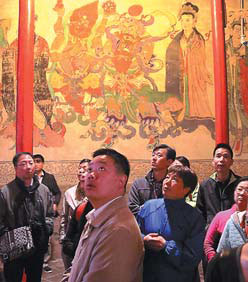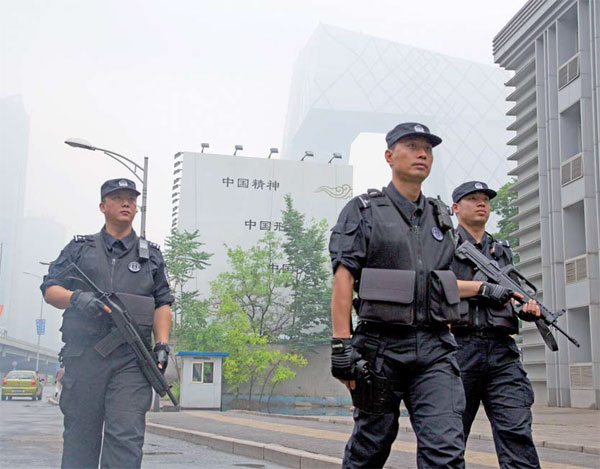What's news

| Special police officers patrol the CBD area in Beijing on May 25. Zhang Yujun / For China Daily |
Patrol officers armed to combat terrorism
With security being beefed up across China, police officers are receiving special training to ensure they can effectively use the weapons they will be issued to combat terrorism, according to the Ministry of Public Security.
Since March, the ministry and local police departments have been arranging for weapons instructors and psychologists to offer special training to patrol police before they are armed.
Guns are tightly restricted in the country. Only SWAT officers ordinarily carry weapons, while others, such as officers who patrol neighborhoods, do not.
Violent attacks, including a number by terrorists, have killed almost 100 people around the country this year.
Education to boost security in Xinjiang
The central government's decision to crack down on terrorists and improve livelihoods in the Xinjiang Uygur autonomous region will help bring security and prosperity, residents and analysts said.
Urumqi resident Zhao Jiepei, 28, mother of a 3-year-old boy, is confident the measures can help. "I think everyone like me wants their children to live in a stable and developed society," she said.
This year, the regional government has earmarked 900 million yuan ($150 million) to support 195 programs covering ethnic handicrafts, farm produce, Uygur medicine and the clothing industry.
A statement from a meeting of China's top leaders on Monday said stability in Xinjiang is strategically vital to China's reform and development as well as national security.
To achieve security and development in the region, the government promised to vigorously fight terrorism and religious extremism and to improve livelihoods and the region's economy.
Keys to developing new Silk Road

Tourism and cultural exchanges will be useful tools in building the new foundation for the Silk Road economic belt, an official from China's northwestern provinces said.
Zhang Shengzhen, secretary-general of the Gansu provincial government, said the modern Silk Road will promote commodity exchanges as well as cultural.
"Launching more cultural exchanges and tourism activities between China, Central Asia and Turkey will help those trade partners further understand the meaning of the Silk Road economic belt, and realize that China will not be the only winner on the route to the West," Zhang said.
The modern Silk Road is more than just a channel for China to import resources such as crude oil, natural gas or farm products from Central Asia, Zhang said.
Tensions rise as fishing vessel sinks
Maritime tensions have escalated, with China demanding that Vietnam stop its policy of harassment in the South China Sea following the sinking of a Vietnamese fishing boat.
China has also rebutted comments made by Japan regarding the Xisha Islands and announced the relocation of an oil rig, whose deployment this month led to deadly anti-China riots in Vietnam.
The rig has been moved for second-phase operations that analysts said had long been planned.
The Vietnamese fishing boat sank close to the rig. Chinese Foreign Ministry spokesman Qin Gang said Vietnam bore sole responsibility with its "insistence on forcefully disrupting China's normal operations and its dangerous actions on the sea".
All 10 crew members from the boat were rescued after the sinking on Monday evening about 31 km from the rig.
Nobel winners aim to inspire youth
Top Chinese scientists, who have traditionally focused on research and teaching at universities, are being encouraged by Nobel Prize winners and other top scientists from around the world to inspire young people and increase their interest in science.
Nobel Prize winners Erwin Neher of Germany and Shing-Tung Yau of the US gave speeches on May 24 about brain research and advances in science at the 16th annual meeting of the China Association for Science and Technology.
Physicist Douglas Osheroff, a Fields Medal winner from Harvard University, shared his thoughts on modern mathematics.
Neher said it was important to encourage young generations to follow their own curiosity and "not just go along with the usual things that other people did".
Beidou to help safeguard fishermen
The Beidou navigation satellite system will help establish a security system to protect fishermen in Hainan province, industry insiders said.
Qi Chengye, manager of the engineering technology center of BDStar Navigation, a company that provides the Beidou service to 80 percent of China's fishing vessels, said that BDS mainly provides instant alarms and unique short messaging services, as well as positioning devices for fishing vessels.
"The alarm button installed in the client terminals enables fishermen to instantly report emergencies to fishery departments," Qi said.
"The vessel management system based on BDS can also request assistance from nearby vessels, which will greatly help protect fishermen."
According to the Ministry of Agriculture's South China Sea fishery bureau, more than 380 conflicts between Chinese fishermen and the fishery departments of some neighboring countries occurred from 1989 to 2010.
Of the more than 11,300 fishermen involved in the conflicts, 25 people died or vanished and more than 800 were jailed.
Large aircraft to boost power
China must develop its own large passenger jetliner no matter how difficult this may be, President Xi Jinping said.
Chinese engineers are struggling to stick to the development schedule, and obstacles have recently pushed back domestic models' maiden flights.
Xi made the comments during an inspection of premises of Shanghai's Commercial Aircraft Corp of China, which is working on the C919. He said the country must spare no effort to build a strong manufacturing industry and develop its own large aircraft so China can become a real world power.
"In the past, someone said the best choice for us is to lease (passenger aircraft) from others and then to buy (them), and that the last option is to make our own," the president told the company's engineers on May 23.
"But we have reversed this notion. We will invest more to develop and produce our own large aircraft."
Xi boarded a demonstration prototype of the C919 and sat in the first-class cabin to feel how comfortable the seat was, Xinhua News Agency reported.
China Daily-Xinhua
(China Daily European Weekly 05/30/2014 page2)
Today's Top News
- Takaichi must stop rubbing salt in wounds, retract Taiwan remarks
- Millions vie for civil service jobs
- Chinese landmark trade corridor handles over 5m TEUs
- China holds first national civil service exam since raising eligibility age cap
- Xi's article on CPC self-reform to be published
- Xi stresses improving long-term mechanisms for cyberspace governance































